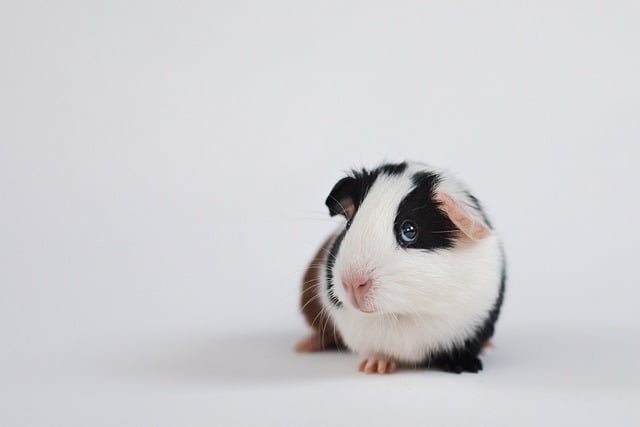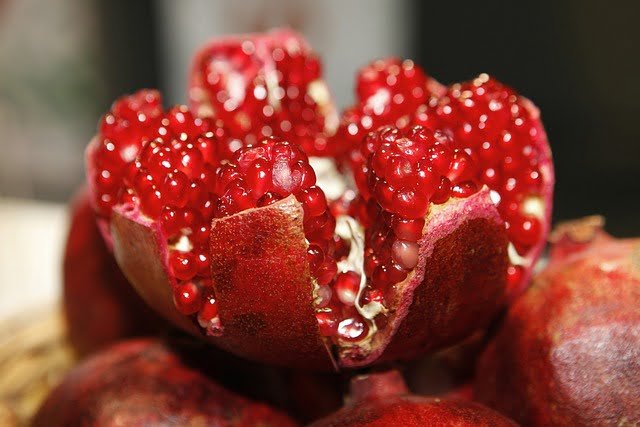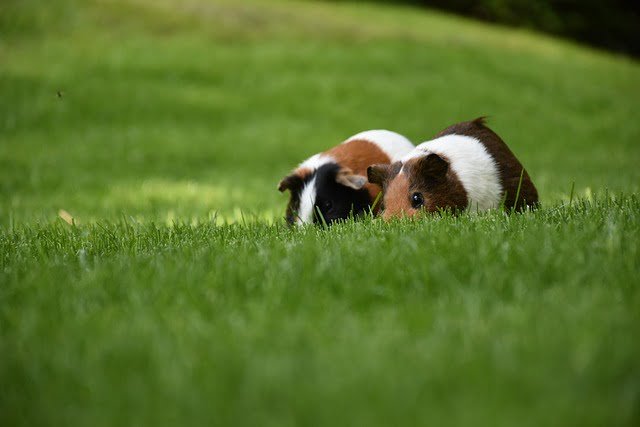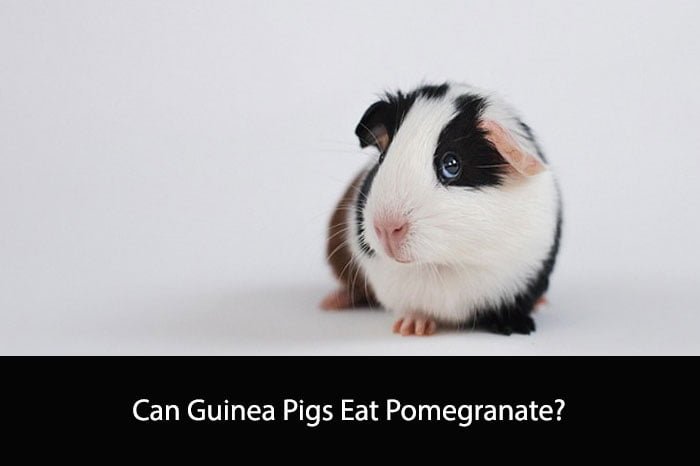Guinea pigs are adorable and social animals that make great pets. However, as a responsible pet owner, it’s important to ensure that your furry friend is getting the right nutrition. A balanced diet is essential for the health and well-being of your guinea pig. While there are many fruits and vegetables that are safe for guinea pigs to eat, it’s important to know which ones are safe and which ones are not.
One fruit that you may be wondering about is pomegranate. Pomegranates are a popular fruit known for their juicy, red seeds. But can guinea pigs eat pomegranate? The answer is yes, guinea pigs can eat pomegranate, but it should be given in moderation. Pomegranate is a good source of vitamin C, which is an essential nutrient for guinea pigs. However, it’s important to remember that pomegranate is high in sugar, so it should only be given as an occasional treat.

Understanding Guinea Pigs’ Dietary Needs
As responsible pet owners, it is important to understand the dietary needs of our guinea pigs. Guinea pigs are herbivores, which means they require a diet that consists mainly of vegetables, fruits, and hay. A well-balanced diet is essential for their overall health and wellbeing.
Guinea pigs have a unique digestive system that requires them to eat frequently throughout the day. They have a high metabolism and require a constant supply of food to maintain their energy levels. Therefore, it is important to provide them with a variety of foods to ensure they are getting all the necessary nutrients.
Hay is the most important part of a guinea pig’s diet. It provides essential fiber that helps to maintain healthy digestion. Fresh hay should be available to them at all times. Timothy hay is the best option for adult guinea pigs, while alfalfa hay is suitable for young guinea pigs.
In addition to hay, guinea pigs require a variety of fresh vegetables and fruits. Leafy greens such as kale, spinach, and parsley are excellent sources of vitamin C and other nutrients that are essential for their health. Fruits such as apples, strawberries, and blueberries can be given as treats, but should be given in moderation due to their high sugar content.
It is important to avoid feeding guinea pigs foods that are high in fat, sugar, or salt. These can cause digestive problems and other health issues. Additionally, some foods such as chocolate, caffeine, and avocado are toxic to guinea pigs and should be avoided at all times.
By providing a well-balanced diet that includes hay, vegetables, and fruits, we can ensure our guinea pigs are healthy and happy.
Pomegranate: An Overview
Pomegranate is a fruit that is native to Iran and has been cultivated for thousands of years. It is considered a superfood due to its high nutritional value and health benefits. Pomegranates are rich in antioxidants, vitamins, and minerals, making them a great addition to any diet.
The fruit is typically round and about the size of an apple. It has a tough, leathery skin that is usually red or yellow, and the inside is filled with hundreds of small, juicy seeds called arils. Pomegranate seeds are sweet and tart, and they have a crunchy texture that makes them a popular snack.
In addition to being a tasty treat, pomegranates have been used for medicinal purposes for centuries. They are believed to have anti-inflammatory and anti-cancer properties, and studies have shown that they may help lower blood pressure and reduce the risk of heart disease.
When it comes to feeding pomegranate to guinea pigs, it is important to note that while the fruit is safe for them to eat, it should be given in moderation. Pomegranate is high in sugar, which can be harmful to guinea pigs in large quantities. It is best to offer pomegranate as an occasional treat, rather than a regular part of their diet.
Overall, pomegranate is a nutritious and delicious fruit that can provide a variety of health benefits. However, it should be consumed in moderation, especially for guinea pigs, to avoid any negative effects from its high sugar content.
Can Guinea Pigs Eat Pomegranate?
Pomegranate is a delicious fruit that is rich in vitamins and antioxidants. As guinea pig owners, we may wonder if it is safe to feed pomegranate to our furry friends. In this section, we will explore the potential health benefits and risks of feeding pomegranate to guinea pigs.
Health Benefits
Pomegranate is a good source of vitamin C, which is essential for guinea pigs as they cannot produce this vitamin on their own. Vitamin C helps to boost their immune system and prevent illnesses such as scurvy. In addition, pomegranate contains antioxidants that can help to protect guinea pigs from cellular damage and reduce the risk of certain diseases.
Potential Risks
While pomegranate can provide health benefits to guinea pigs, it is important to feed it in moderation. Too much pomegranate can cause digestive issues such as diarrhea and upset stomach. In addition, the high sugar content of pomegranate can lead to obesity and dental problems if fed excessively.
It is also important to note that guinea pigs should not be fed the seeds of the pomegranate as they can be a choking hazard. Only the juicy flesh of the fruit should be offered to your guinea pig.
In conclusion, pomegranate can be a healthy treat for guinea pigs when fed in moderation. However, it is important to be aware of the potential risks and to only offer the juicy flesh of the fruit. As always, consult with your veterinarian before making any significant changes to your guinea pig’s diet.

How to Feed Pomegranate to Guinea Pigs
Pomegranate is a nutritious fruit that can be a great addition to your guinea pig’s diet. However, it is important to feed it in moderation and prepare it properly to ensure your guinea pig’s safety and health. Here are some tips on how to feed pomegranate to your guinea pig.
Preparation Steps
Before feeding pomegranate to your guinea pig, you need to prepare it properly. Follow these steps:
- Wash the pomegranate thoroughly under running water to remove any dirt or debris.
- Cut the pomegranate into small pieces, removing the seeds and the tough white membranes.
- Remove any remaining seeds from the fruit’s skin, as they can be a choking hazard for your guinea pig.
- Rinse the pieces again to ensure that all seeds and membranes are removed.
Serving Suggestions
Once you have prepared the pomegranate, you can serve it to your guinea pig. Here are some serving suggestions:
- Offer a small piece of pomegranate as a treat, not as a regular meal. Guinea pigs need a balanced diet with hay, fresh vegetables, and a small amount of pellets.
- Introduce pomegranate gradually to your guinea pig’s diet, starting with a small amount and increasing it over time.
- Make sure your guinea pig is comfortable with the fruit before leaving it unsupervised with a larger piece.
- Do not feed your guinea pig spoiled or rotten pomegranate, as it can cause digestive problems.
In summary, feeding pomegranate to your guinea pig can be a healthy and enjoyable treat. However, it is important to prepare it properly and serve it in moderation. If you have any concerns or questions about your guinea pig’s diet, consult with a veterinarian.
Alternatives to Pomegranate for Guinea Pigs
While pomegranate can be a healthy and tasty treat for guinea pigs, it’s not always easy to find or may not be in season. Fortunately, there are many other fruits and vegetables that can provide similar nutritional benefits. Here are some alternatives to pomegranate that guinea pigs can enjoy:
1. Apples
Apples are a great source of vitamin C, fiber, and antioxidants. Guinea pigs can eat the flesh, skin, and seeds of apples, but be sure to remove the core and any seeds that may be a choking hazard.
2. Berries
Berries such as strawberries, raspberries, and blueberries are high in vitamin C, fiber, and antioxidants. They make a great occasional treat for guinea pigs, but should be given in moderation due to their high sugar content.
3. Leafy Greens
Leafy greens such as kale, spinach, and parsley are packed with vitamins and minerals that are essential for guinea pig health. They can be given daily as a part of their regular diet or as a treat.
4. Carrots
Carrots are a good source of vitamin A, fiber, and antioxidants. Guinea pigs can enjoy small amounts of raw or cooked carrots as a treat, but be sure to limit their intake due to their high sugar content.
5. Bell Peppers
Bell peppers are a great source of vitamin C and fiber. Guinea pigs can enjoy small amounts of raw or cooked bell peppers as a treat, but be sure to remove the seeds and any white pith as they can be difficult to digest.
Overall, there are many fruits and vegetables that guinea pigs can enjoy as a healthy treat. It’s important to always introduce new foods slowly and in small amounts to avoid any digestive upset.
Conclusion
In conclusion, while pomegranates are a nutritious fruit, they are not recommended for guinea pigs. We have found that pomegranates are high in sugar and acidity, which can cause digestive issues and other health problems for guinea pigs.
While some guinea pigs may enjoy the taste of pomegranate, it is important to prioritize their health and well-being by providing them with a balanced diet that meets their nutritional needs. This means sticking to foods that are safe and healthy for guinea pigs, such as hay, fresh vegetables, and limited amounts of fruit.
Overall, we recommend avoiding pomegranates as a treat for your guinea pig and instead opting for safer alternatives. By doing so, you can help ensure that your furry friend stays healthy and happy for years to come.

Frequently Asked Questions
Are pomegranates safe for guinea pigs to eat?
Yes, pomegranates are safe for guinea pigs to eat in moderation. They are a good source of vitamins and minerals, including vitamin C, which is essential for guinea pigs.
What are the potential risks of feeding pomegranates to guinea pigs?
Feeding too much pomegranate to your guinea pig can cause digestive problems, such as diarrhea and stomach upset. Additionally, the seeds can be a choking hazard, so make sure to remove them before feeding pomegranate to your guinea pig.
Can pomegranates cause digestive problems in guinea pigs?
Yes, feeding too much pomegranate to your guinea pig can cause digestive problems, such as diarrhea and stomach upset. It is important to feed pomegranate in moderation and to monitor your guinea pig’s reaction to it.
What other fruits are safe for guinea pigs to eat?
Other fruits that are safe for guinea pigs to eat in moderation include apples, bananas, blueberries, raspberries, strawberries, and watermelon. It is important to introduce new fruits slowly and in small amounts to avoid digestive upset.
Are there any fruits that guinea pigs should avoid?
Yes, there are some fruits that guinea pigs should avoid, including grapes and raisins, as they can be toxic to guinea pigs. Additionally, fruits that are high in sugar, such as mangoes and pineapples, should be fed in moderation.
How much pomegranate should I feed my guinea pig?
You should feed pomegranate to your guinea pig in moderation, as too much can cause digestive problems. A good rule of thumb is to feed a small amount, such as a few seeds or a small piece of fruit, once or twice a week.





